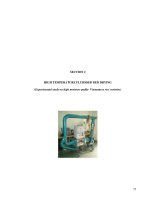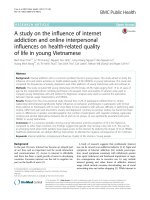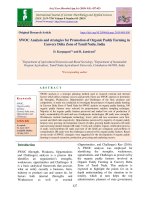Promotion of nutritional security through organic farming
Bạn đang xem bản rút gọn của tài liệu. Xem và tải ngay bản đầy đủ của tài liệu tại đây (131.25 KB, 4 trang )
Int.J.Curr.Microbiol.App.Sci (2019) 8(3): 389-392
International Journal of Current Microbiology and Applied Sciences
ISSN: 2319-7706 Volume 8 Number 03 (2019)
Journal homepage:
Review Article
/>
Promotion of Nutritional Security through Organic Farming
R. Jansirani*
Department of Sustainable Organic Agriculture, Tamil Nadu Agricultural University,
Coimbatore-03, India
*Corresponding author
ABSTRACT
Keywords
Nutritional security,
Organic farming,
Ecology, Fairness,
Care, Quality,
Health
Article Info
Accepted:
04 February 2019
Available Online:
10 March 2019
Agriculture is the driving force of economy of our country. There is growing awareness on
health, food safety and environmental issues associated with the indiscriminate use of
pesticides and fertilizers. The alternative form of production such as organic farming is the
spectrum of production methods that is supportive of the environment and safety food.
Based on the principle of organic agriculture on 7 th of every month paid training
programme on organic agriculture is organizing at this Department of Sustainable Organic
Agriculture since 2015 onwards. Ninety responders were selected based on random
sampling procedure from North Western zone (Coimbatore, Erode, Tiruppur districts) and
Western zone (Dharmapuri Salem districts) based on maximum number of certified
organic farmers attended the training programme during 2017-18. The respondents were
interviewed personally by a semi structured interview schedule. Cent per cent of the
trainees were adopted the organic principle of health because organic agriculture would
sustain and enhance the health of soil, plant, animal, human and planet as one and
individual. 83.00 per cent of the trainees adopted the principle of ecology followed by
principle of fairness (78 %) and principle of care of organic farming (52%). The principles
organic agriculture were addressed on healthy and quality foods, preserves the
environment improves public health and also significant benefits both to the economy as
well as to the social cohesion of rural areas. Majority of the respondents expressed that
maintaining of good health and price of the organic products was low when compared with
synthetic products.
Introduction
Organic agriculture is a holistic production
management system which promotes and
enhances agro-ecosystem health, including
biodiversity, biological cycles, soil biological
activity and safety foods. It emphasizes, the
use of management practices in preference to
the use of off–farm inputs, taking into account
that regional conditions require locally
adapted systems. This is accomplished by
using, where possible, agronomic, biological,
and mechanical methods, as opposed to using
synthetic materials, to fulfill any specific
function within the system (FAO, 1999).
Organic products are grown under a system of
agriculture without the use of chemical
389
Int.J.Curr.Microbiol.App.Sci (2019) 8(3): 389-392
fertilizers and pesticides to get organic
products. This is a method of farming that
works at grass root level preserving the
reproductive and regenerative capacity of the
soil, good plant nutrition and sound soil
management, produces nutritious food rich in
vitality which has resistance to pests and
diseases
and are now codified. The principles apply to
agriculture in the broadest sense, including the
way people tend soils, water, plants and
animals in order to produce, prepare and
distribute food and other goods. They concern
the way people interact with living landscapes,
relate to one another and shape the legacy of
future generations.
Adoption of organic farming principles
The principles of organic agriculture serve to
inspire the organic movement in its full
diversity. They are the roots from which
organic agriculture grows and develops. They
express the contribution that organic
agriculture can make to the world and a vision
to improve all agriculture in a global context.
The Principles of Organic Agriculture serve to
inspire the organic movement in its full
diversity.
Understand the motivation of organic farmers,
the practices they use and what they want to
achieve, it is important to understand the
guiding principles of organic agriculture.
These principles encompass the fundamental
goals and caveats that are considered
important for producing high quality food,
fiber and other goods in an environmentally
sustainable way.
The principles of organic agriculture have
changed with the evolution of the movement
The principle of health
The principle of ecology
The principle of fairness
The principle of care
The International Federation for Organic
Agriculture Movement’s (IFOAM) definition
of Organic agriculture is based on
Organic Agriculture should sustain and enhance the health of soil,
plant, animal, human and planet as one and indivisible.
This principle points out that the health of individuals and
communities cannot be separated from the health of ecosystems healthy soils produce healthy crops that foster the health of
animals and people
This principle roots organic agriculture within living ecological
systems. It states that production is to be based on ecological
processes, and recycling. Nourishment and well-being are
achieved through the ecology of the specific production
environment.
It aims to produce a sufficient supply of good quality food and
other products
This principle states that precaution and responsibility are the key
concerns in management, development and technology choices in
organic agriculture
As per the concept of NPOP (2005) organic
agriculture is a system of farm design and
management to create an ecosystem, which
can achieve sustainable productivity without
the use of artificial external inputs such as
chemical fertilizers and pesticides. The above
reasons the respondents were interviewed and
distributions of respondents details below.
390
Int.J.Curr.Microbiol.App.Sci (2019) 8(3): 389-392
Materials and Methods
The Department of Sustainable Organic
Agriculture, TNAU is conducting on 7th of
every month paid training on organic
agriculture since August 2015. The yesteryear
2017-18 was taken for study purpose because
more number of trainees attended the training
programme due to awareness on health and
food safety among the trainees. Twenty five
trainings were conducted, in which 1294
trainees were participated the training on
organic agriculture. North Western comprises
Dharmapuri, Krishnagiri, Salem, Namakkal
and Western zones comprises Coimbatore,
Erode and Tirupur were selected based on
number of organic growers were attended the
organic agriculture trainings organized by this
department. Among 1294 trainees 342 trainees
from North Western zone and Western zones.
Ninety responders were selected based on
random sampling procedure from Coimbatore,
Tiruppur, Erode, Dharmapuri and Salem
districts (Table 1).
their confidence about the role of organic
farming in the nutritional security. The finding
derived is consistent with the results of
Sasidharan (2015) and Azam (2015).
Table 2 inferred that Cent per cent of the
trainees were adopted the principle of health
because organic agriculture would sustain and
enhance the health of soil, plant, animal,
human and planet as one and indivisible.
83.00 per cent of the trainees adopted the
principle of ecology followed by principle of
fairness (78 %) and principle of care (52%).
Reasons were environmental damages and
poisoning of food chain is raising consumer
concerns as well. Therefore, generating need
to promote organic farming. Organic farming
is a sustainable method which depends upon
natural way of farming and using techniques
like crop rotation, vermi-composting, biofertilizers, crop management, animal manure,
off-farm organic waste, crop residues etc.,
instead of synthetic chemicals, which allows
soil to stay alive and food to be safe.
Results and Discussion
It inferred that high percentage of farmers,
farm women, youth and housewife’s were
attended the training on organic agriculture
due to growing demands on organic
agriculture among farmers, farm women,
youth, house wife and others in the society.
There is to be needed for more training to
change the attitude of farmers and enhance
Majority of the respondents expressed that
price of the organic products was low when
compared with synthetic products. The finding
is line with the results of Sathyendra Kumar
(2015). In conclusion, the trainees had strong
belief on the principle of health through
adoption of organic farming in their field and
households.
Table.1 Popularization of organic agriculture through trainings
S.No
1
Details
Monthly paid training on Organic
Agriculture
Name of the
participants
Farmers , Farm women
youth and housewife
391
No. of Trainees
attended
2017-2018
1294
Int.J.Curr.Microbiol.App.Sci (2019) 8(3): 389-392
Table.2 Distribution of respondents according to their adoption of organic farming principles
N-90
S.No
Adoption of organic farming principles
No. of Respondents
%
1
The principle of health
90
100.00
2
The principle of ecology
75
83.00
3
The principle of fairness
70
78.00
4
The principle of care
60
52.00
It concluded that organic agriculture
principles were on soil health, quality foods,
preserves the environment, improves public
health and also significant benefits both to the
economy as well as to the social cohesion of
rural areas. Majority of the respondents
expressed that price of the organic products
was low when compared with synthetic
products.
Technology, Volume 4 Issue 3.
FAO. 1999. Guidelines for The production,
Processing, Labeling and Marketing of
Organically Produced Foods. Joint
FAO/ WHO Food standards program
codex Ailmentairus Commission, Rome,
CAG/GL 32. pp. 49.
Sathyendra Kumar AD and H. M.
Chandrashekar. 2015. A Study on
Consumers Behavior Towards Organic
Food Products In Mysore City,,
International Journal of Management
Research & Review IJMRR/ Volume
5/Issue 11, 2249-7196.
Shashidhara, K. K. 2006. A study on
Management of Eco – friendly practices
by Vegetable growers of North
Karnataka. Ph.D. Thesis, University of
Agricultural Sciences, Dharwad.
References
Azam, M. D. S. 2015. The Influence of SocioDemographic Factors in adopting
Organic
Farming
Practices.
International
Journal
of
Interdisciplinary and Multidisciplinary
Studies (IJIMS), 2(5): 8-17.
Sonvy Gupta 2017. Food Safety and Organic
Farming. MOJ Food Processing
How to cite this article:
Jansirani, R. 2019. Promotion of Nutritional Security through Organic Farming.
Int.J.Curr.Microbiol.App.Sci. 8(03): 389-392. doi: />
392









